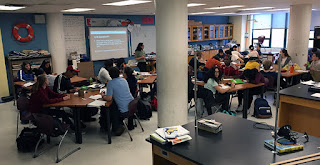I've been to a few conferences, and they typically end with "WE'RE GONNA CHANGE THE WORLD!" And then we go home all fired up and go back to what we've always done, for better or worse.
Educon was different--the sessions I attended were not hypothetical woo-woo love-fests. I saw what others were doing, what has been working, and what needs working on. The conversations focused on the possible, on the now, on the work being done.
 |
| No, Sir Ken did not keynote this year. |
I've been to a few conferences, and they typically feature education rock stars--personality often trumps pedagogy. Groupies vied for selfies with their favorite silver-haired snakes.
Educon was different--it's not that groupies were not welcome (seems anyone who doesn't mind a healthy dose of criticism is welcome), but there noticeably little fawning (if any). The Science Leadership Academy students ran the show, and not one of them had silver hair (though at least one had a strikingly green mohawk*).
 |
| Disclosure: I did get a traveler mug. (Photo from here.) |
I've been to a few conferences, and they typically feature lots of swag. You toss goodies into a free bag, shove them into your luggage, and find them when you pack for your next trip.
I got very little swag, and what I got was because I was a presenter--a wonderful Educon traveling mug and a few pieces of Peanut Chews that nourished me on the train trip home.
 |
| Inside SLA, via Education Week |
We had free rein at the Science Leadership Academy building. We could wander anywhere, and we did. The building looks like mine (and probably yours if you work in a public school). Yes, I saw a broken outlet, but in the same room I got to sit in on an impromptu get together with folks sharing thoughts as the sunlight streamed through the large southern window.
 |
| SLA Ultimate team and alumni, and a post well worth reading |
I've been to a few conferences that had a few folks of color and, of course, the requisite panel member (might be gay, might be black, might be some wack-a-doodle with a British accent) who is supposed to cover up a lot of sins, but cannot cover up the original one.
SLA is an intentional community, and Educon reflects this.
I got called out a few times over the weekend, (mostly) gently, and always with reason--for some behaviors I am aware of, a couple of times for things I had not realized. I expected as much, and am grateful for it.
The money goes back to the school to support its 1:1 program.












